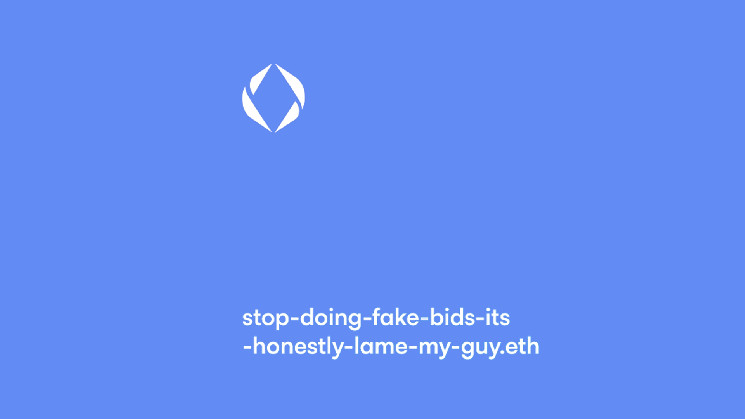Bored Ape whale loses $150,000 of ETH in ENS listing fumble

Franklin Caldwell, or “franklinisbored” as he is known on Twitter, lost 100 ETH ($150,000) in an Ethereum Name Service (ENS) domain name transaction on Wednesday.
Caldwell is the seventh-largest holder of Bored Ape Yacht Club non-fungible tokens (NFTs) and is regarded as an influencer in the NFT space.
It all started when Caldwell created the ENS domain “stop-doing-fake-bids-its-honestly-lame-my-guy.eth» on Tuesday. Caldwell then placed a 100 wrapped ETH (WETH) bid on the ENS domain.
This was done to draw attention to the fact that people routinely create ENS with comical phrases and place fake bids on them. This is done to get attention from a listing bot that’s shares such bids on Twitter — and can often see a large number of retweets if the names are particularly humorous.
Another NFT collector who goes by «8892» on Twitter placed a 1.89 WETH ($2800) offer on the x2y2 marketplace. Caldwell accepted the offer, forgetting that he had previously placed the 100 WETH “joke bid” on the same item. 8892 was then able to accept the existing 100 WETH offer since it was still there. This automatically triggered the sale of the ENS name back to Caldwell for 100 WETH.
In all, 8892 made a 97.5 WETH in profit off Caldwell’s mistake. The Bored Ape whale realized the error and contacted 8892 by sending an on-chain message to 8892. Caldwell also refunded the 1.89 WETH in the hope of getting 8892 to reverse the transaction. Yet the latter wasn’t moved by the gesture.
“I ripped this guy off for 100 ETH and he just sent me another 1.9?” 8892 tweeted in response.
The problem with uncancelled NFT listings
Caldwell is not the first to suffer such a loss due to a failure to cancel previous NFT listings. You have to pay transaction fees to cancel an existing listing and NFT owners have been known to forget to do so. Even when a sale happens, it does not cancel previous offers and the new owner can choose to accept any one of them.
Sometimes, NFT owners move their items to a different wallet, forgetting to cancel existing listings. When these items are moved back to the original wallet, the old listing becomes activated. This listing bug problem has been exploited in the past on OpenSea leading to high-value NFTs being sold for significantly lower prices.
Caldwell’s mistake is also part of a growing interest in ENS domain names. One ENS collector recently bought sony.eth for $72,000 while amazon.eth has also saw a $1 million offer — although it wasn’t accepted.
ENS belongs to the class of web3 usernames. They are a type of human-readable crypto address that are easier to read than blockchain wallet addresses that consist of long alphanumeric text strings. ENS names are minted as NFTs and can be transferred on sold on platforms like OpenSea, x2y2, and LooksRare.






 Bitcoin
Bitcoin  Ethereum
Ethereum  Tether
Tether  USDC
USDC  TRON
TRON  Dogecoin
Dogecoin  Cardano
Cardano  LEO Token
LEO Token  Chainlink
Chainlink  Stellar
Stellar  Hedera
Hedera  Bitcoin Cash
Bitcoin Cash  Litecoin
Litecoin  Monero
Monero  Dai
Dai  OKB
OKB  Gate
Gate  Cronos
Cronos  Ethereum Classic
Ethereum Classic  VeChain
VeChain  Cosmos Hub
Cosmos Hub  Algorand
Algorand  KuCoin
KuCoin  Maker
Maker  Stacks
Stacks  Tether Gold
Tether Gold  Theta Network
Theta Network  IOTA
IOTA  Tezos
Tezos  Zcash
Zcash  TrueUSD
TrueUSD  NEO
NEO  Polygon
Polygon  Dash
Dash  Synthetix Network
Synthetix Network  Zilliqa
Zilliqa  Decred
Decred  Qtum
Qtum  0x Protocol
0x Protocol  Basic Attention
Basic Attention  DigiByte
DigiByte  Siacoin
Siacoin  Holo
Holo  Ravencoin
Ravencoin  NEM
NEM  Ontology
Ontology  Nano
Nano  Enjin Coin
Enjin Coin  Hive
Hive  Waves
Waves  Lisk
Lisk  Status
Status  Pax Dollar
Pax Dollar  Steem
Steem  Huobi
Huobi  BUSD
BUSD  Numeraire
Numeraire  OMG Network
OMG Network  Bitcoin Gold
Bitcoin Gold  Ren
Ren  Bytom
Bytom  Augur
Augur  Bitcoin Diamond
Bitcoin Diamond